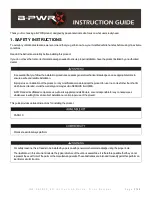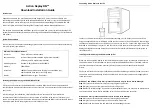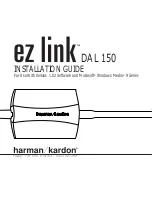
1
Adjustable Electronic Voltage Regulator
Installation, Adjustment and Recommendations
Special Tools Required; Digital Voltmeter.
External Solid State Transitorized Voltage Regulator with Adjustable Voltage
Application
BMW R Airhead 1970-1995 and Moto Guzzi 1970-on
(with Bosch Alternator)
Euro MotoElectrics Part # VR-ExtAdj
Background
The function of a voltage regulator in a charging system is to limit the voltage produced by the
alternator to a set limit. In other words, it regulates or limits the voltage to a pre-determined set
point coming from the alternator to the battery. The voltage regulator has no ability to increase the
amperage output of the alternator. It simply regulates voltage below a range that is safe for the
battery and other electrical components in the vehicle
’s electrical system.
The Bosch alternator and charging system used in the BMW and Moto Guzzi has the voltage
regulator monitor the voltage across the battery indirectly through diodes in the rectifier / diode
board. Therefore a direct method of reading the charging system voltage is to attach the positive
lead of the voltmeter to the B+ lead (large male spade terminal) of the rectifier. Due to indirect
voltage through the other charging system components, the adjustable voltage regulator allows to
compensate for these variations (reductions) and to maximize the voltage arriving to the battery.
Feature
This voltage regulator has the feature of allowing the properly informed technician to select the
maximum voltage to maximize your BMW or Moto Guzzi charging system.
NOTE: It will not compensate for damaged batteries due to sulfation etc. or other electrical system
deficiencies, such as poor or intermittent grounding.
It will not increase amperage output.
“Tuning up” the electrical system
Battery
The battery must be in good condition for the voltage to pass through the battery.
A 12 volt battery requires usually a minimum of 13.8 to 14.4 volts to achieve a complete charge.
This range depends on climactic conditions (temperature) and also the design and overall sulfation
state of your battery. An old sulfated battery with shorted cells will not re-charge to ~14.0 Volts !
Therefore the battery is the basic foundation to begin
“tuning-up” the charging system’s to it’s
optimum performance.
Inspecting Wiring
The entire electrical system should be inspected for solid, clean connections, especially the battery
cables and all grounds. Clean and tight contacts should be the standard, and it is especially
important to focus on all the ground returns. All connections tend to deteriorate over the years due




















